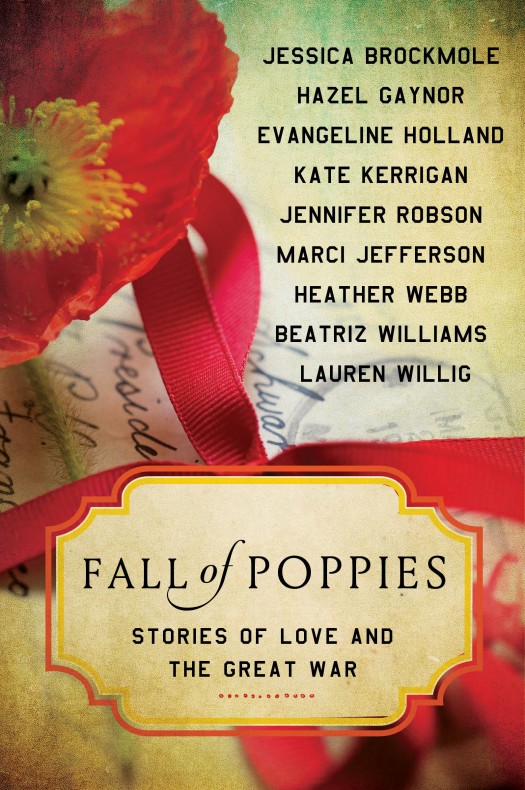Take Five: Heather Webb and FALL OF POPPIES: Stories of Love and the Great War
By Writer Unboxed | March 20, 2016 |
 Please welcome our own Heather Webb—author of Becoming Josephine and Rodin’s Lover—here today with exciting news of an anthology released just a few days ago: Fall Of Poppies: Stories Of Love and The Great War. In this book, Heather and eight other top voices in historical fiction deliver an “unforgettable collection of short stories set in the aftermath of World War I.”
Please welcome our own Heather Webb—author of Becoming Josephine and Rodin’s Lover—here today with exciting news of an anthology released just a few days ago: Fall Of Poppies: Stories Of Love and The Great War. In this book, Heather and eight other top voices in historical fiction deliver an “unforgettable collection of short stories set in the aftermath of World War I.”
On the eleventh hour of the eleventh day of the eleventh month…
November 11, 1918. After four long, dark years of fighting, the Great War ends at last, and the world is forever changed. For soldiers, loved ones, and survivors the years ahead stretch with new promise, even as their hearts are marked by all those who have been lost.
As families come back together, lovers reunite, and strangers take solace in each other, everyone has a story to tell.
Fall of Poppies is already a bestseller on Amazon in Historical Fiction Anthologies, with these exciting reviews:
“An atmospheric homage to one of history’s most emotionally devastating episodes.” –Booklist
“Sure to resonate with readers…looking for historical fiction with elements of intrigue and romance.” –Library Journal
What’s the premise of Fall of Poppies?
HW: The premise is a series of stories set around the first Armistice Day—11/11/ 1918 at 11 a.m.—and the emotions and events that lead up to it. WWI had ended, but life had to go on. In this collection, each author explores a different angle of how people endured, recreated themselves, and the hope that moved them forward.
What would you like people to know about the story itself?
HW: I’ll speak to my particular story called “Hour of the Bells.” As a cultural geographer and former military brat, I find myself perpetually fascinated by the idea of “the outsider” within a culture not their own, what it means to belong, and how our values and ideals can shift as we assimilate. Beatrix is a German-born woman who married a Frenchman, and their only son is ridiculed for being a dirty “boche,” spurring him to join the war efforts. When her son perishes, she can’t forgive herself for who she is and how she has failed him—and sets out on a quest to prove her love in an outward, explosive way. I couldn’t think of a more powerful motivation than a mother’s love and grief and wanted to go down that road, see how it felt.
Also, I wanted to address the emotional component of rage that can accompany grief. Women are so often portrayed as silently enduring their pains or imploding in a sense. Men, on the other hand, are furious in their loss and go on these rampages to assuage their grief. Think “Braveheart,” for example. As a mother and a woman, I can assure you there would be no shortage of anger if something were to happen to my child. My Beatrix has very real rage in her pain and seeks vengeance in what I hope is a gripping, cinematic story.
What do your characters have to overcome in this story? What challenge do you set before them?
HW: All of the characters in Fall of Poppies must confront the fall out of war—grief, fear, remorse, forgiveness. Finding love again.
What unique challenges did this book pose for you, if any?
HW: An anthology poses many challenges, the first of which is choosing the best authors to contribute to the book. After they’ve agreed to be a part of the project, I had to enforce deadlines, collect promotional materials, and plan appearances along with the publicist. I wound up coordinating all kinds of travel plans for the ladies, as well. The travel and appearances aren’t mandatory by any means, but it is one of the best parts of working together. We had an absolute ball speaking together on our panels.
Another major challenge was short story writing itself. You’re creating characters and illustrating their lives in a nugget—one which must carry a lot of punch to make an impact. There isn’t time to build a world and embellish the characters. This proved challenging for many of the contributors, as we discussed on our panels. But as a lean writer myself, it felt natural to condense yet preserve the kapow.
What has been the most rewarding aspect of having written this book?
HW: It’s hard to pinpoint one thing. I really fell in love with my character and feel as if it’s the type of story that must be heard. But another very rewarding piece is the connections I’ve made with this wonderful group of authors!
You can learn more about Fall of Poppies on Heather’s website.










Heather, congratulations on publication. I can’t wait to read it. I give you credit for taking on such an ambitious and collaborative project. There are inherent challenges in working with other writers, even under the best of conditions. You managed to pull it all together. I wish you and your co-authors the best.
Thank you, Christopher! It was ambitious, but so much fun. I really enjoyed the whole process. I think, as a former teacher and coach, doing group projects is a natural thing for me–something I enjoy. :) As always, I appreciate your comments!
I’m really interested in the unifying premise. My dad was born almost exactly 24 hours before the armistice, so technically during WW1. Both my grandfathers served during WW1, and my dad and three uncles served during WW2. That time certainly shaped the fortunes of my family. Best of luck to you and your fellows, Heather!
Vaughn, this is an incredible story! I wish I had known, I may have figured that birth 24 hours prior into one of the stories somehow…And all that family in WWII also! I’m fascinated by this era of history. In fact, I didn’t realize just how much until I started researching for this anthology. I’m totally hooked. My next two WIPs will take place during this era as well.
As always, thank you for your lovely comments!
I’ve been so looking forward to this book, Heather! I’ve been obsessed with WW1 for years now. To me it is the moment when the western world changed forever. Off to nab my copy now.
Thank you, Barbara! I agree with you–the western world and modern world changed completely–psychologically, technologically, morally, etc. In ever way. I’m obsessed with this era myself. In fact, I’m working on another novel set during this era that will be out next year. :)